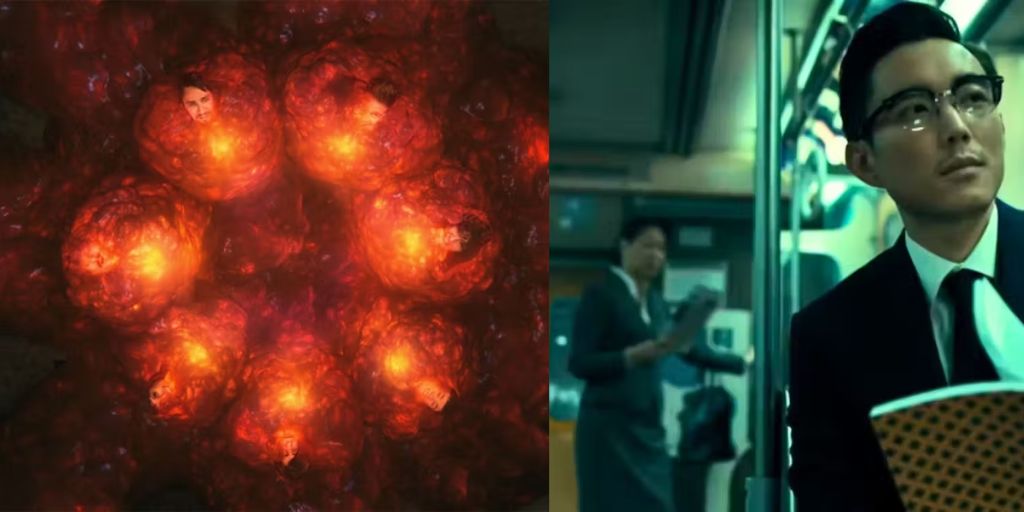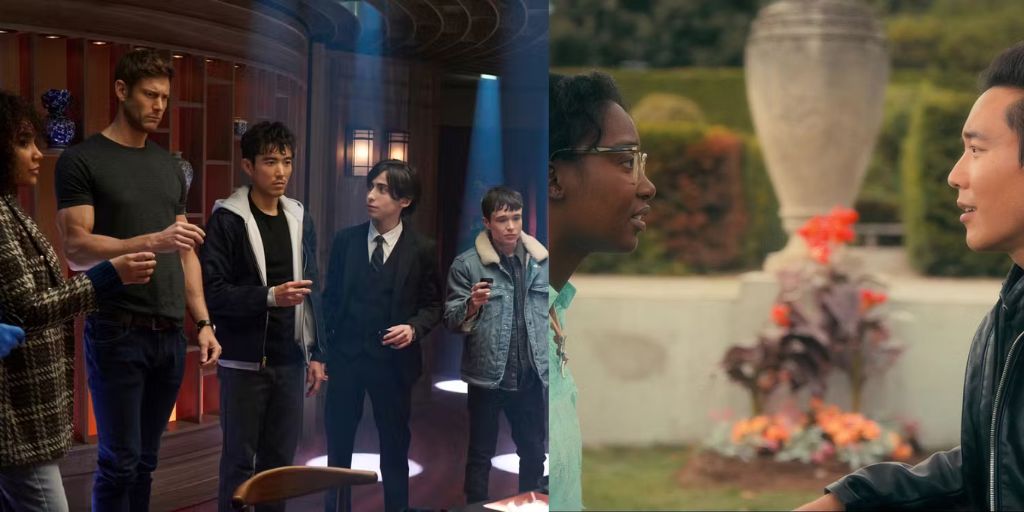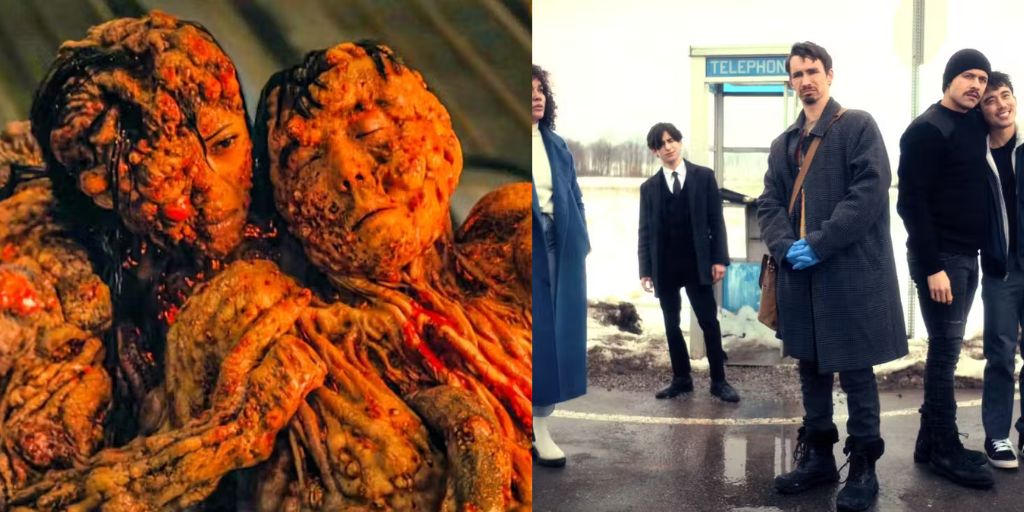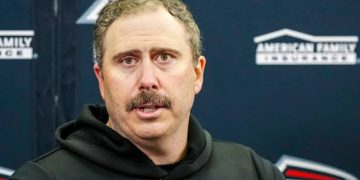There’s no doubt that The Umbrella Academy stands out as an unusual and unique show. Much of its weirdness comes from its source material.
The Dark Horse comics, created by Gerard Way and artist Gabriel Bá, include strange and unexpected elements like a talking monkey butler and the zombie robot corpse of Gustave Eiffel attempting to destroy Paris.
However, since its debut, The Umbrella Academy has carried one major mystery: the death of Ben Hargreeves (Justin H. Min).
Ben’s passing happened before the events of both the TV series and the original comics, leaving fans with questions about what led to his untimely demise. The TV show made a significant departure from the comics by providing viewers with the answer.
As The Umbrella Academy reaches its fourth season, the surviving siblings—Luther (Tom Hopper), Viktor (Elliot Page), Allison (Emmy Raver-Lampman), Diego (David Castañeda), and Klaus (Robert Sheehan)—begin to investigate Ben’s death.
They eventually find out that it was part of a larger plan created by their adoptive father, Reginald Hargreeves (Colm Feore). What’s more, Ben turns out to be linked to the “Cleanse,” the apocalyptic event the Hargreeves siblings are desperately trying to stop. But what exactly happened to Ben, and why is his death so connected to the looming destruction of the world?
The Umbrella Academy Finally Reveals Ben Died During “The Jennifer Incident”
The long-awaited details of Ben’s death are revealed in the Season 4 episode titled “The Cleanse.” Before this, the show only referred to his passing as the “Jennifer Incident,” a phrase that relates to a woman the Hargreeves were once tasked with protecting.
In “The Cleanse,” it is revealed that Jennifer had been locked inside a container guarded by an arms dealer. Ben, attempting to save her, ultimately sets her free. However, what the other Hargreeves did not know was that Reginald shot both Ben and Jennifer.

Reginald had a specific reason for this. Jennifer carried a unique particle called “Durango” in her body, which had a dangerous reaction when it came into contact with the “Marigold” inside Ben. If they were to remain near each other for too long, it would trigger a catastrophic chain reaction that would reset the universe to its original form.
Steve Blackman, the showrunner of The Umbrella Academy, discussed Ben’s death with Gerard Way, who had his own ideas for how this incident played out in the comics. Blackman revealed in an interview with Entertainment Weekly that Way’s version will offer an alternate take on the event:
“It was one of the unanswered questions when I talked to Gerard, who has a slightly different take on it and is still figuring that out for down the road… But I like the idea that in every timeline they’re toxic together, that somehow or other, them coming together leads to the worst thing in the world.
I like the idea that, even though not all of them were there (because Five wasn’t there and Lila wasn’t there), there’s a shared trauma of what it must’ve been like to be around for Ben’s death.”
Ben’s Role in The Umbrella Academy Show Is Much Larger Than in the Comics
The show makes significant changes to Ben’s character compared to his role in the original comics. In fact, one could argue that the TV show transforms Ben into a fully developed character, unlike the comics where his presence is much more limited.
Outside of the third volume of the comics, Hotel Oblivion (which inspired parts of Season 3), Ben rarely appears in the source material. In contrast, the TV show gives Ben a major role, particularly because Klaus can communicate with him using his ability to speak with the dead.
Season 3 of The Umbrella Academy introduces a major twist when the Hargreeves discover themselves in an alternate timeline where Ben is alive.
In this new reality, Ben is the leader of the Sparrow Academy, a more skilled and focused superhero team that was formed by that timeline’s version of Reginald after his encounter with the Umbrella Academy in 1963.
Ben’s expanded role in the TV show also gives him the opportunity to develop a stronger personality, something that was missing in the comics. His dynamic with Klaus is one of the highlights of Seasons 1 and 2, with memorable moments like the scene in the Season 1 episode “Changes,” where Klaus tries to get high, and an exasperated Ben punches him in frustration.
This moment underscores how Ben has been struggling to prevent his brother from self-destructing over the years. In stark contrast, the Sparrow Academy version of Ben is much more ruthless, willing to do whatever it takes to succeed.
He carries a large chip on his shoulder after being demoted to Number 2 in his team’s hierarchy. Justin H. Min deserves significant credit for crafting two completely different versions of the same character, based on what little information is given about Ben in the comics. It’s unfortunate that Season 4 did not fully capitalize on this development.
The Revelation of Ben’s Death Leaves Room for Improvement
Ben’s death at the hands of Reginald, along with the revelation that his death caused the latest apocalypse, should have been a more prominent plot point in Season 4. Instead, the season focuses on stopping the Cleanse and misses the opportunity to fully explore the emotional aftermath of Ben’s death.
One possible reason is that Season 4 has only six episodes, compared to the longer runs of Seasons 1-3. As a result, one of the show’s strongest elements—watching the Hargreeves cope with their traumatic past—is not given as much attention as it deserves.

Ben and his siblings needed more time to reflect on how his death affected their relationships, particularly with their father, Reginald. In fact, Reginald could have easily been the main antagonist of Season 4, as many of the challenges his children face are due to his manipulations.
There’s also the unresolved plot point from Season 3 involving an older version of Ben that was left unexplored. In the end, the revelation of Ben’s death answers a key question fans have had since the series began, but it highlights the areas where the final season could have been improved with more depth and exploration.
The Umbrella Academy is available for streaming on Netflix in the U.S.




